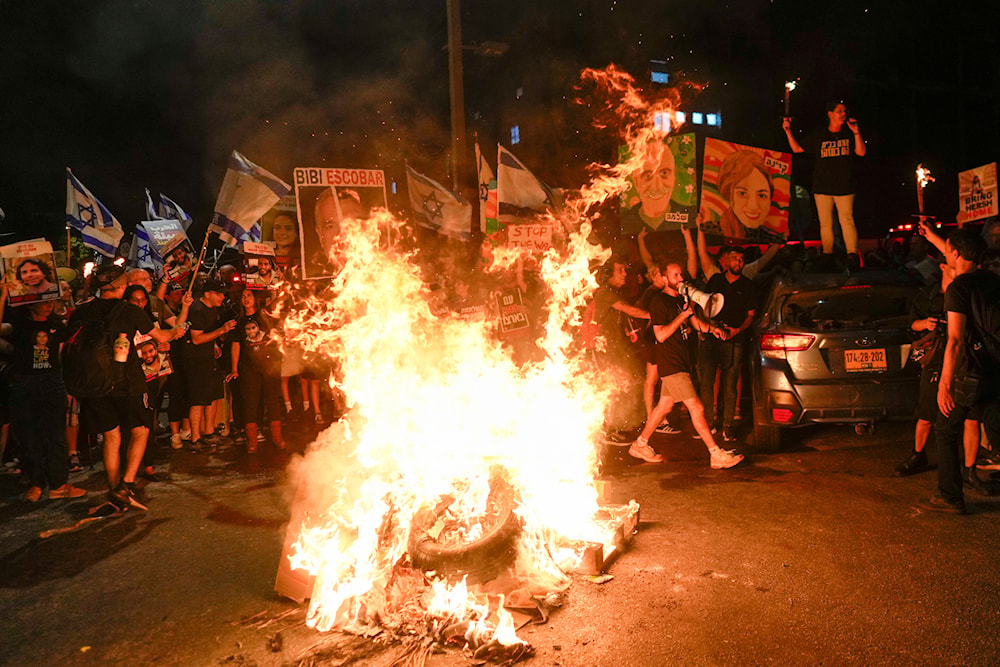Settlers in southern Israel do not trust the cabinet to wage war

Israeli settlers in southern occupied Palestine lack confidence in their government’s conduct of the war, and many have decided not to return to their settlements.
-
Israeli settlers protest against the government of Israeli Prime Minister Benjamin Netanyahu and demand the release of prisoners held in the Gaza Strip, in Tel Aviv, occupied Palestine, June 29, 2024 (AP)
A report by the Israeli Channel 12 revealed on Thursday that settlers in the southern regions of occupied Palestine express deep distrust about the conduct of the ongoing war and the prospects of a lasting ceasefire in its wake.
A Channel 12 Moderator: Air raid sirens have been sounding daily in the settlements around Gaza for nearly nine months. This has caused considerable anxiety among the settlers. An opinion poll shows that a significant number of the displaced settlers from the south have decided not to return to their settlements.
The survey, conducted by the Tefen company, asked the displaced settlers several questions and revealed a pervasive sense of crisis. The first question was about the settlers’ mental state since October 7. Seventy percent said they felt unwell, while only a minority described their mental state as good or acceptable.
When asked whether they planned to return to their settlements once the war was over and a return was possible, only 22 percent answered yes. Another 23 percent said they would not return, while a significant proportion had already returned due to a lack of alternatives. 7 percent were undecided.
Regarding the economic impact since the conflict began, 70% of respondents described their economic situation as bad, while 25% reported no change. This latter group generally consisted of those who were able to work remotely regardless of their location.
The Israeli journalist stressed that many displaced settlers had given up their jobs and a significant number of them were still unemployed. The fourth question in the survey asked whether they trusted that peace would return after the war. Only 33% expressed confidence in this outcome, while 67% did not.
The journalist stressed that these figures reflect the deep “lack of confidence” of the southern settlers in the current handling of the conflict, noting that they “are witnesses to a war that has been going on for a long time and do not see any positive developments on the horizon.”
Tefen Director General Mally Bitzur-Parnes reiterated that after nine months of war, the vast majority of settlers are convinced that their personal security “will never return”.
In addition, a quarter of them “have no intention of returning to the South,” and those who do will return psychologically broken and economically damaged, facing social and cultural problems with their children, she added.
At a demonstration on Saturday, protesters carried banners denouncing Israeli Prime Minister Benjamin Netanyahu and his government, with one even accusing them of “abandoning the north, the south and everything in between.”
This happened while tens of thousands of Israelis were evacuated from settlements in northern Palestine along the border with Lebanon under fire from Hezbollah. Since October 8, the Lebanese resistance group has been conducting operations against Israeli military targets in support of the Gaza Strip. Link to the cessation of his attacks until the end of the ongoing Israeli aggression against Gaza.
The Times of Israel also mentioned that tens of thousands of protesters had gathered in Tel Aviv for the largest anti-government rally in recent weeks.
In addition, thousands more marched in Haifa and gathered in occupied Al-Quds, as well as in Beer al-Sabe’ and Mitzpe Ramon.
In this context, the Forum of Hostages and Missing Families, which represents some relatives of Israeli prisoners held by the Palestinian resistance in Gaza since October 7, is holding its weekly rally at the so-called Hostage Square in Tel Aviv.
Accordingly The Times of IsraelThe aim of the organizers is to put pressure on the Israeli government to negotiate an agreement with Hamas to release the prisoners.
Israeli officials claim that the Palestinian resistance captured 251 people on October 7, 2023, 116 of whom are still in the Gaza Strip. Of these, 42 were killed, including at least nine soldiers, the Israeli occupation military says.
The resistance in Gaza has repeatedly stated that the Israeli occupation forces kill their own prisoners in the Gaza Strip due to their indiscriminate and brutal bombings.
While the Hamas movement has reiterated its willingness to engage positively with any agreement that ensures a ceasefire, the withdrawal of the Israeli occupation from Gaza and a fair prisoner exchange, Netanyahu said last week that he would not agree to any deal The agreement calls for an end to the war in the Gaza Strip, suggesting that he is only open to a “partial agreement” that would allow the return of prisoners still held by the Palestinian resistance.



